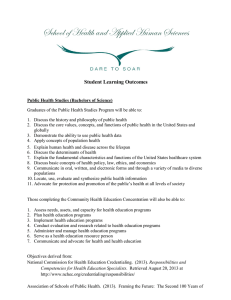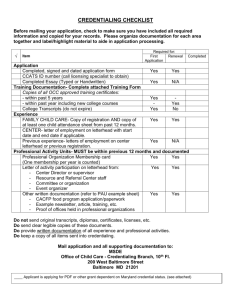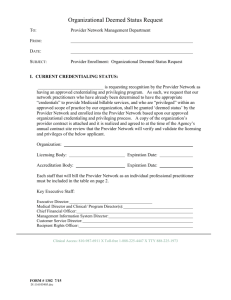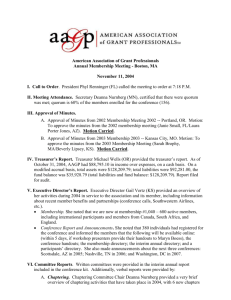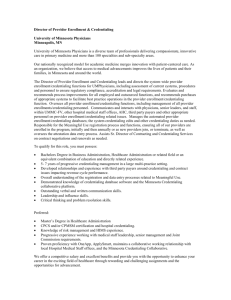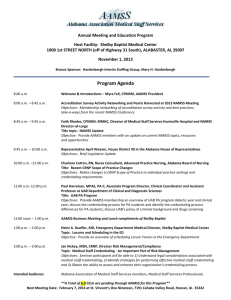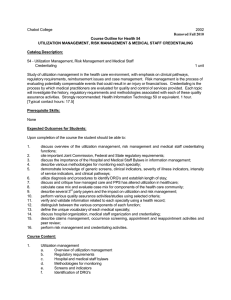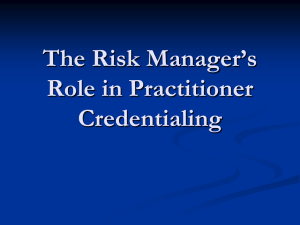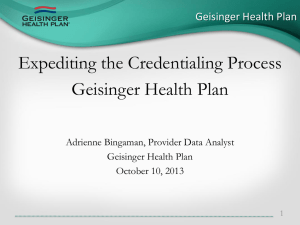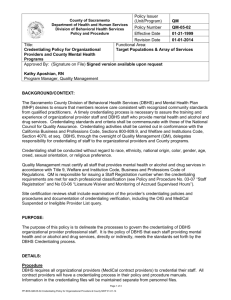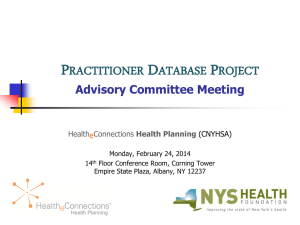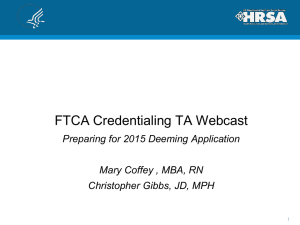Credentialing Management in the Electronic Health Record
advertisement
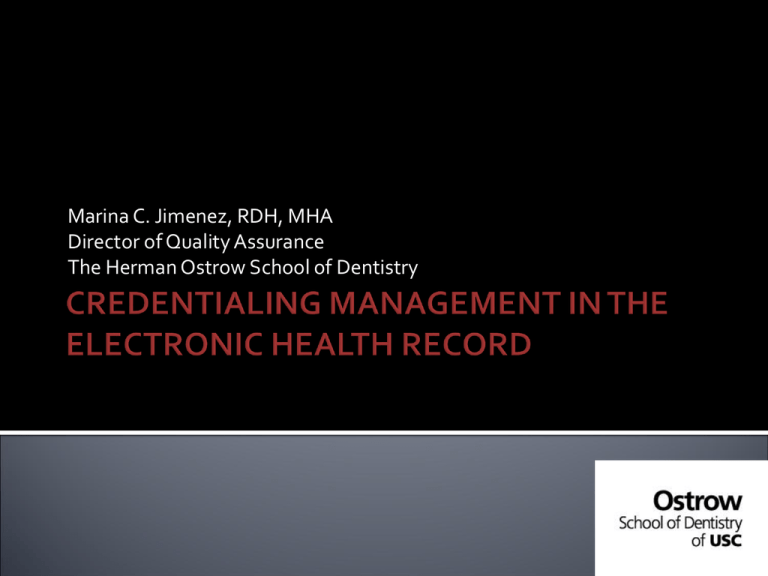
Marina C. Jimenez, RDH, MHA Director of Quality Assurance The Herman Ostrow School of Dentistry Credentialing is a systematic approach to the collection and verification of providers professional qualifications, such as: •Relevant training •Licensure •Certification, and/or registration to practice in a healthcare field •Academic background •Assessment of whether the practitioner meets certain criteria relating to professional competence and conduct CLINICAL PRACTICE COMMITTEE QUALITY PROCESS IMPROVEMENT SUBCOMMITTEE COMPLIANCE AND CREDENTIALING SUBCOMMITTEE PROFESSIONAL STANDARDS AND POLICY SUBCOMMITTEE The Compliance and Credentialing Sub-Committee will, under the oversight of the CPC: 1) review and act upon all information received during the credentialing and re-credentialing process as defined by the School’s policy for the granting, renewing, changing or terminating a practitioner’s clinical practice privileges; 2) oversee the implementation of the School’s compliance program developed as part of the University's Healthcare Compliance Program. Membership: The membership of the Compliance and Credentialing Committee (CCC) is approved by the Dean and shall be comprised of representatives from each of the clinical divisions and the Compliance Officer who shall constitute the voting membership. Also represented on this committee in the status of ex-officio members are the Director of Faculty Affairs, Director of Quality Assurance, Director of Healthcare Compliance; Director of Clinical Financial Services; Manager of Electronic Health Records/axiUm and the Assistant Vice President of Healthcare Compliance for the University. Additional faculty and campus representatives can be added as deemed necessary by the chairperson of this committee and as approved by the Dean. Appointments shall represent a balance of clinical programs. Terms will be two years or as otherwise determined by the Dean. Meetings: The Compliance and Credentialing Sub Committee will meet at minimum once a month. Additional meetings may be called by the chairperson with at least 72 hours advanced notice. Voting: All faculty members of the Compliance and Credentialing sub-committee may vote. Non-faculty members are considered exofficio members and are non-voting members. Quorum: A majority of the voting members constitutes a quorum _______ Completed Application _____ Current CA License (s) relative to job function (Primary Source Verification) _____ Current CPR Certificate _____ Current DEA Certificate (When Applicable) _____ Curriculum Vitae _____ Health Screening for TB / Hepatitis _____ On-line Compliance Education ______ HIPAA Certificate ______ OIG Exclusionary Check ______ Signature Verification Form ______ National Practitioner's Database Check ______ Primary Source Verification of Work Experience ______ Compliance Member in Good Standing Memo ‘Access’ database maintains all Human Resource information Houses: Personal information, clinical status (i.e., patient care, pre clinical), all licensures and certifications relative to job function, credentialing dates, date of hire Manages Email reminders to providers at 90, 60, 30 day intervals regarding upcoming credential expiries or EXPIRED (cc to appropriate personnel as well as QA office) Email notifications also sent when Personnel database updates the provider profile relative to licensure and certification (cc to appropriate personnel as well as QA office) Under the direction of faculty, students and residents enter treatment and documentation relative to patient care in the EHR Faculty who oversee the student and resident treatment ‘approve’ documentation by swiping their personal axiUm ID card indicating approval The axiUm ID card is tied directly to the expiry set up in the axiUm user profile Credentialing Management Maintains regulatory guidelines Quality delivery of Care Decreases liability Effective credentialing policies and procedures tied into the electronic health record (EHR), demonstrates commitment to excellence in delivery of quality care as well as compliance in credentialing. Modules within the EHR assist in managing and provide support to ensure provider credentials are current and valid in order to supervise care. The benefits of the EHR do not stop at patient care. marina@usc.edu
